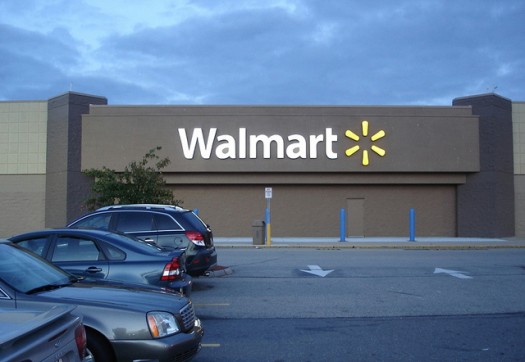A Placemaking Journal
Walmart and the Quest for a Better Mousetrap
“I don’t shop at Walmart.”
Talk about a loaded phrase. Five simple words, but issue them collectively and you effectively open a Pandora’s Box of suggestion: Where you stand economically. Where you stand politically. How you feel about the environment. Or localism. Or capitalism.
It’s like erecting a giant movie screen upon which other people immediately begin projecting their own principles; or their beliefs; their biases; their satisfactions; their frustrations.
I’ve experienced it first hand because, for me, it happens to be true. I don’t shop at Walmart. But jump to the conclusion that I’m a bleeding heart, or an elitist, or that I only shop local, or that I’m a dyed-in-the-wool tree hugger who hates corporations and, for the most part, you’d be wrong.
It’s more nuanced than that.
I don’t shop there because I don’t care to. I don’t enjoy it. I believe that, everyday low prices aside, their net impact on communities — financial, social and environmental — is often a negative. And regardless of their phenomenal global success, I don’t particularly admire some of the tactics that have gotten them to where they are today.
So I vote with my wallet. But you know what? I have that luxury.
Hard Truth
In working with communities, one thing I’ve learned is that the past is prologue while the story we’re forced to contend with is right here in the now, today, defined by the challenges and opportunities laid out before us.
As an example, consider a small town in the Midwest. At some point in its history, it’s most likely that Walmart came along. They probably built a store just outside the city limits and then undercut the local businesses on Main Street.
Even if those businesses were thriving at the time, they probably began to suffer thereafter. And in time, it may very well have come to pass that Walmart emerged as just about the only place in town to shop and, perhaps, even work.
Global power, local pressure. It happened, and we can’t undo it. Today we find ourselves in its choppy wake, contending with the options of our present reality which — and here’s where things get messy — includes the fact that there are people in our communities who don’t have the luxury of choice. They need to put food on the table. They need to stretch a paycheck farther than it’s physically able to go. Not next week, or next month, or in accordance with a ten-year plan, but tonight.
Frankly, as committed as I am to my own ideology and to more endearing, enduring and equitable communities over the long haul, there’s no way I’m going to stand in the way of that.
Whatever the reason, if your circumstances lead you to Walmart, so be it. Tomorrow’s aspirations aside, you gotta deal with today.

Systems Thinking
Love Walmart or hate ‘em, need them or avoid them at all costs, one thing is indisputable: They became the largest retailer in the world — an economic force besting 157 actual countries — because they’re ridiculously adept at exploiting systems.
The problem isn’t them. It’s us. We set up the rules. We established the infrastructure. They made the most of it. And if it hadn’t been them, it would have been someone else. Because that’s the way our system is designed to work.
I’m not excusing it. I’m simply accepting it.
If we don’t believe that Walmart (or big box retail in general) is in the long-term interest of our cities and towns — and keep in mind, in many places that remains a big if — we need to stop saying “Stop Walmart” and start asking “Why is Walmart trying to come here? What in our regulations or context or actions is incentivizing their business? What unmet demand are they expecting to fill? And can we retool our thinking — and, with it, our community — to serve that demand in other ways? Ways that provide greater economic opportunity for our residents and keep more money circulating locally? Ways that make healthy food accessible at prices people can afford?”
Over time, in the course of such questions, perhaps a new system will emerge. One where the fulfillment of our price and product needs is better served on a smaller, more interdependent scale, breeding stronger communities rather than weaker ones.
New System, New Outcomes
Does the will exist for this kind of consuming systemic change? Do communities really think about long-term prospects so long as there are convenient and affordable places to buy the things they need? I don’t know. But I do know that trying is better for our collective fate than simply waving picket signs and pushing the behemoth off on someone else.

As I’ve written before, pitting neighbor against neighbor, ideology against ideology, is no way to improve a community. Long term success is rooted in shared interests, not warring factions. I feel absolutely no desire to tell people who need Walmart — or even those who simply choose Walmart — that they’re wrong. Those are their choices to make.
But the prospect of helping communities find ways to exist, even thrive, in a world beyond Walmart? Where the drivers of choice — be they price, convenience, style, or whatever — are satisfied locally or in ways that reinforce community resilience? Now that’s a challenge to sink some teeth into.
If you, like me, are uncomfortable with the socioeconomic implications — especially short-term — of anti-Walmart hysterics, here’s your opportunity to abandon the Party of No and begin finding ways to build a better mousetrap. Check out these areas you may want to investigate further:
Land Use Regulations: Zoning is the DNA of the built environment. If your regulations encourage sprawl through single-use zoning and metrics suited to a high-volume, auto-dominated customer base, then that’s the type of business you’re going to attract.
Transportation Patterns: Today’s retail business models are based on traffic counts made possible by arterial-based street networks. What can you do to encourage more connected, walkable and dispersed traffic patterns where you live?
Tax Incentives: If municipalities are willing to incentivize a retailer like Walmart, lured by the promise of jobs and increased tax base, could that same system be retooled to focus — or also focus — internally, serving to incubate local resources and talent?
Systemic Obstacles: What are the barriers standing in the way of local interests, rather than outside operations, rising to meet consumer demands and what can local government do to reduce or eliminate them?
The system that fosters Walmart is not part of the natural order. It’s not an eternal and unchanging truth we must contend with. We created it, and we can revise or even recreate it if we so choose.
For now, we’re in a position to take these matters on by choice. To proactively create communities of more robust networks and increased opportunities. But in a world of depleting energy resources, crazy climate, and polarized politics, that may not always be the case. We may simply wake up one day and find that the present system has failed and Walmart’s fleet of rolling inventory will no longer be dropping by.
Where will that leave the complacent? What will be the fate of those communities presently focused on the promise of “no” rather than on the hard work of change?
There’s still time. Commit to the better mousetrap.
–Scott Doyon
If PlaceShakers is our soapbox, our Facebook page is where we step down, grab a drink and enjoy a little conversation. Looking for a heads-up on the latest community-building news and perspective from around the web? Click through and “Like” us and we’ll keep you in the loop.










